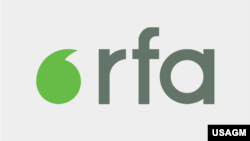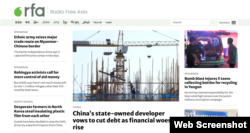After nearly three decades in Hong Kong, VOA's sister outlet Radio Free Asia has closed its physical bureau in the city and no longer has full-time staff there due to the declining press freedom landscape, the outlet announced in a statement Friday.
"Concerns about the safety of RFA staff and reporters in Hong Kong have led us to restructure our on-the-ground operations there. While RFA will retain its official media registration, at this time we no longer have full-time personnel in Hong Kong and have closed our physical bureau," RFA President Bay Fang said in the statement.
The announcement comes less than a week after Hong Kong enacted Article 23, a national security law that media watchdogs warn will further erode press freedom in the city.
The new law is a domestic extension of the controversial national security law that Beijing imposed in 2020 that criminalized secession, subversion, terrorism and collusion with foreign forces. Article 23 builds on that legislation to also criminalize acts such as espionage, external interference and theft of state secrets.
Press freedom groups, including Reporters Without Borders, or RSF, expressed concern about the new law.
"By transposing the national security provisions imposed by Beijing into Hong Kong's domestic laws, the government hopes to restore the illusion of a territory governed by the rule of law while carrying on its campaign against independent voices," Cedric Alviani, RSF's Asia-Pacific bureau director, said in a statement before the law was enacted.
"We urge democracies to build up pressure on Chinese authorities so that full press freedom is restored in the territory," Alviani continued.
RFA, which opened its Hong Kong bureau in 1996, specifically cited Article 23 as a reason behind its departure from the city.
"Actions by Hong Kong authorities, including referring to RFA as a 'foreign force,' raise serious questions about our ability to operate in safety with the enactment of Article 23," Fang said in the statement.
VOA has reached out to the Hong Kong Security Bureau for a comment.
For years, Hong Kong was lauded for its lively and free media environment, but the city's press freedom, along with other civil liberties, quickly deteriorated following the introduction of the national security law in 2020.
Hong Kong and Chinese authorities have denied that the law is harming Hong Kong's media environment and instead say it has helped stabilize the city.
The threats facing independent media in Hong Kong are exemplified by the ongoing national security trial of pro-democracy publisher Jimmy Lai.
The 76-year-old British national stands accused of "collusion with foreign forces" under the national security law and sedition, both of which he rejects. If convicted, Lai faces life in prison.
Hong Kong officials have denied that the trial against Lai is unfair, but press freedom groups and Western governments have condemned the charges as politically motivated and baseless.
Although RFA is physically leaving Hong Kong, the outlet said it would continue to cover the city.
"This restructuring means that RFA will shift to using a different journalistic model reserved for closed media environments," Fang said in the statement.
"For our audiences in Hong Kong and mainland China, who rely on RFA's timely, uncensored journalism: rest assured, our programming and content will continue without disruption," she said.






